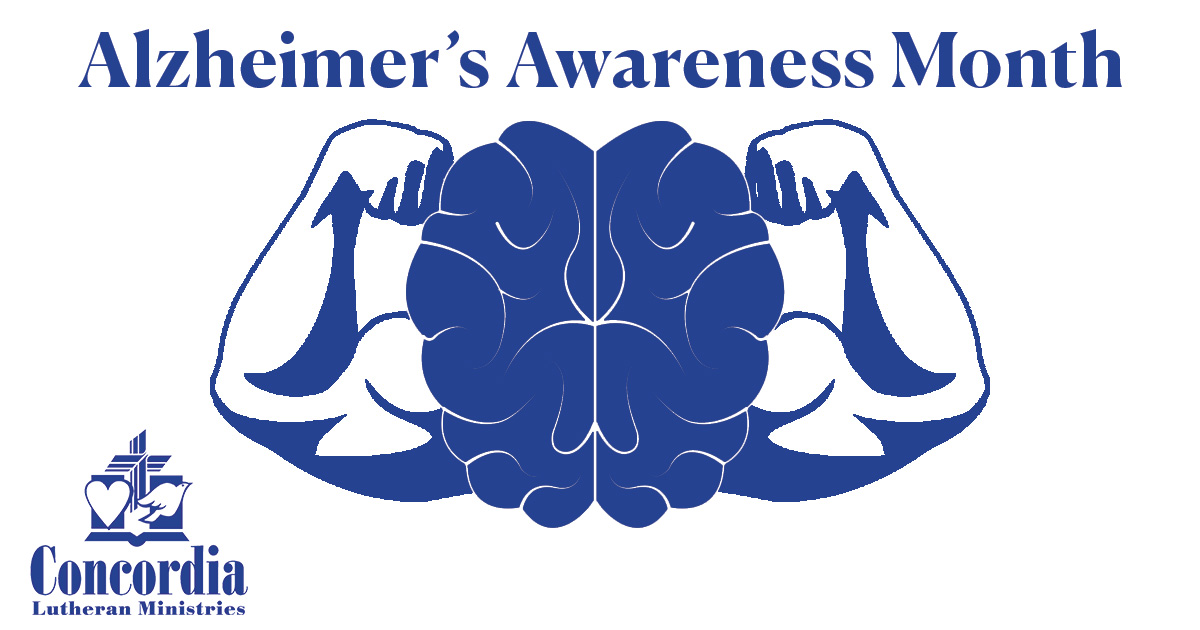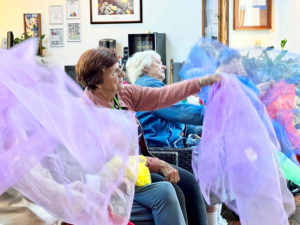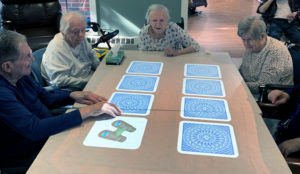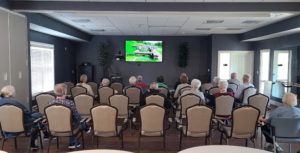Alzheimer’s Awareness Month: The value of a healthy brain in prevention

Every November, the nation draws its attention toward Alzheimer’s Disease, a degenerative brain disease that afflicts millions of people each year. The increased awareness informs the public about Alzheimer’s stages and early recognition, but it also circulates preventative measures as well.
According to the Alzheimer’s Association, more than 6 million Americans are living with Alzheimer’s, and it estimates that number to rise to around 13 million by 2050. In response, the association promotes healthy brain activities that could help prevent the disease.
A few of these prevention tactics particularly align with everyday life across Concordia Lutheran Ministries.
Staying social

Talking with others, sharing stories and general socialization strengthens brain connections. Volunteering, joining a club or sharing moments with friends and family are all examples of staying socially active.
At Concordia at Sumner, residents are consistently attending activities together. According to Amy Malone, Sumner’s activities director, residents have been highly engaged in attending musical performances, crafting in yarn club and elevating their heartrates through exercise groups.
“We also do some purposeful projects they enjoy,” Malone said. “We make bags for our local shelter, and we participate in The Giving Doll Project.”
While people sometimes see Bingo as bland, the Sumner residents sure seem to love it, and it has other elements that coincide with memory care, such as moving pieces onto their card and remembering the callout until they get the chip to the right spot. Despite being competitors, the residents will often help one another.
“Being around somebody else kind of puts you at ease,” she said.
Related article: Concordia at Sumner Residents are Active and Engaged
Mental reps
Sometimes mental gymnastics can help people. It’s recommended for people to challenge themselves with activities involving thought. Completing puzzles, creating art and playing card games are a few ways some accomplish this.
The staff at Concordia at Rebecca Residence and Highpointe at Rebecca host a number of programs helping skilled, personal care and independent living residents flex their mental muscles. Deborah Matzie, Highpointe’s activities director, said most of their activities have some form of memory benefit.
“Some activities help with fine motor skills, like measuring, using scissors, lining things up that match, rolling dice and moving tiles in a game. All of it helps with memory,” Deborah said. “Other activities, like trivia which is a favorite among residents, not only makes them think but draws on life experiences, which leads to recollections and discussions.”

Rebecca Dombroski, Rebecca Residence’s activities director, said their community also has new technology, such as virtual reality equipment and a Tovertafel tabletop projector, that helps give some residents a task they may not have seen before.
“Residents are actively using parts of their brain that they may not use without being provoked,” Dombroski said. “The best moments are when a resident is apprehensive about attending activities, so they just want to watch. Then, once they see the participation from others, they find the courage to participate, and they gain the confidence needed to insert themselves in future activities.”
Related article: Keeping the Mind Sharp
Fresh learning
While fun and games are great, but traditional classroom and book learning also have a positive impact on brain health. Experts say things like taking classes at a local college, community center or even online, can reduce a person’s risk of cognitive decline and dementia.
Concordia has been developing our own network of classes, Concordia Institute of Lifelong Learning, with a number of key community partnerships. The program initially started at the Haven Apartments at the Concordia at Cabot campus, but it has also been introduced at Highpointe. Other locations, such as Sumner, Concordia Village of Tampa and Concordia of the South Hills have used the program as a template for their own.
“It is convenient that the classes are held here on campus, so they don’t have to go far to attend,” said Kassie Walker, Haven activities director. “We try to offer enticing topics that will pique their interest.”

Classes range in topics. Some classes focus on nature, such as birds, mushrooms and reptiles. Others focus on history, such as the settling of Penn’s Woods or the development of Moraine State Park.
“Our program gives the residents a chance to discover new possibilities in areas they might have been curious about but have never had the opportunity to explore,” Walker said. “Learning new activities and skills keeps their minds fit and alert.”
Related article: Concordia Village of Tampa Memory Care
Outside these three areas, Concordia still meets the other preventative measures in one form or another across all of our locations and throughout home and community services. It’s hard not to with our wide-ranging services and programs, including personal care, skilled, assisted living, independent living and home health care. To learn more about our unique locations, click here.
Get Updates From Concordia
There is always a LOT happening at Concordia! Would you like to stay up-to-date with our news and events? Sign up for our monthly e-newsletter here.